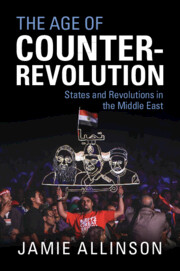Book contents
- The Age of Counter-Revolution
- The Age of Counter-Revolution
- Copyright page
- Dedication
- Contents
- Figures
- Acknowledgements
- A Note on Transliteration
- 1 Introduction
- 2 What Is Counter-Revolution?
- 3 The Revolutionary Situations
- 4 Political Revolutions and Counter-Revolutions
- 5 Militarising Counter-Revolution
- 6 From Revolution to State Collapse
- 7 Revolutionary States?
- 8 Conclusion
- Glossary
- Notes
- Bibliography
- Index
5 - Militarising Counter-Revolution
Syria and Bahrain
Published online by Cambridge University Press: 06 May 2022
- The Age of Counter-Revolution
- The Age of Counter-Revolution
- Copyright page
- Dedication
- Contents
- Figures
- Acknowledgements
- A Note on Transliteration
- 1 Introduction
- 2 What Is Counter-Revolution?
- 3 The Revolutionary Situations
- 4 Political Revolutions and Counter-Revolutions
- 5 Militarising Counter-Revolution
- 6 From Revolution to State Collapse
- 7 Revolutionary States?
- 8 Conclusion
- Glossary
- Notes
- Bibliography
- Index
Summary
This chapter focuses on Syria and Bahrain, states in which the ruling regimes of 2011 managed to retain power: albeit in the case of Syria at the cost of more than a decade of civil war. Acknowledging the great differences between the two states, the chapter highlights the similarity in the role of sectarianism and external intervention: binding the counter-revolutions from above, below and without. The chapter presents a materialist understanding of sectarianism, however, as the product of both particular forms of political economy and counter-revolutionary strategy. In Syria, this produced a cross-sectarian ruling elite, albeit with an Alawi core, that nonetheless had profoundly sectarian effects: whereas in Bahrain, sectarianism served more straightforwardly as a prop of the Khalifa ruling house. The Syrian counter-revolution could also rely, albeit to a lesser degree, on the inheritance of the previous revolution from above and the promotion of an ideology of development and modernisation. In both states, narratives of external intervention – Western, Zionist or Iranian – served to strengthen the counter-revolutionary cause, while extensive outside support for counter-revolution – mainly Russian and Iranian in Syria, Saudi and Emirati in Bahrain – made up for the limited appeal of the counter-revolution from below. This chapter focuses on Syria and Bahrain, states in which the ruling regimes of 2011 managed to retain power: albeit in the case of Syria at the cost of more than a decade of civil war. Acknowledging the great differences between the two states, the chapter highlights the similarity in the role of sectarianism and external intervention: binding the counter-revolutions from above, below and without. The chapter presents a materialist understanding of sectarianism, however, as the product of both particular forms of political economy and counter-revolutionary strategy. In Syria, this produced a cross-sectarian ruling elite, albeit with an Alawi core, that nonetheless had profoundly sectarian effects: whereas in Bahrain, sectarianism served more straightforwardly as a prop of the Khalifa ruling house. The Syrian counter-revolution could also rely, albeit to a lesser degree, on the inheritance of the previous revolution from above and the promotion of an ideology of development and modernisation. In both states, narratives of external intervention – Western, Zionist or Iranian – served to strengthen the counter-revolutionary cause, while extensive outside support for counter-revolution – mainly Russian and Iranian in Syria, Saudi and Emirati in Bahrain – made up for the limited appeal of the counter-revolution from below.
- Type
- Chapter
- Information
- The Age of Counter-RevolutionStates and Revolutions in the Middle East, pp. 143 - 185Publisher: Cambridge University PressPrint publication year: 2022

